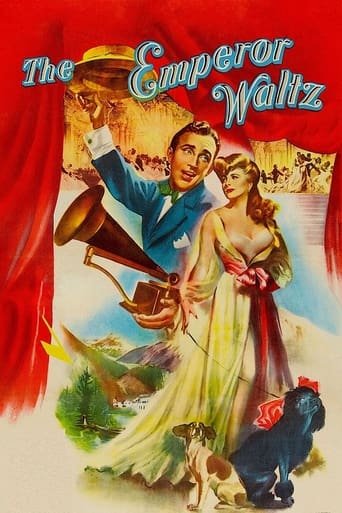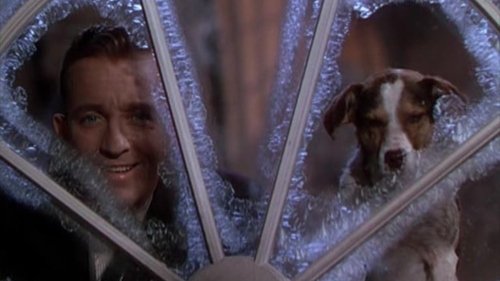Kevin Clarke
I find it amazing, that Wilder - 12 years after the Broadway success of Erik Charell's WHITE HORSE INN, and 18 years after the Berlin premiere of the show by the same creative team (a version Wilder certainly saw, since it was the talk of the town he lived in at the time) - re-uses many of the elements that made that revue-operetta such a smash hit: those pop art Tirolean costumes and villages, the lake, the jodels, the dancers in Lederhosen and Dirndl... some of the village scenes and costumes actually look, as if Wilder was using the original operetta-designs by Ernst Stern. He even quotes original operetta music (by Lehár, instead of Ralph Benatzky, just to mislead the viewer - and maybe avoid copyright problems.) Also, the basic idea of the Charell/Hans Müller operetta is re-used here: a man from a different culture ends up in the Alps and has to cope with a totally different 'Austrian' way of life. In the original it's the Berlin industrialist Giesecke, in the movie it's Bing Crosby as the American salesman. In both cases, the clash of cultures is delightful to watch and makes for some hilariously comic scenes. Perhaps, in the movie, Crosby is not the ideal 'ironic' actor needed for a story of this kind... (he plays the story rather 'straight'). Still, Wilder makes sure the viewer understands that it is all a gigantic joke. (Actually, he even shows the Austrian Kaiser as a silly old fool, exactly like in the operetta.) It would be interesting to analyze show and film. Even though theater historians prefer to ignore films, and film historians prefer to ignore theater productions. But, as Richard Norton pointed out in his essay on the career of WHITE HORSE INN in the English speaking world, Warner Brothers bought the rights for a film version of the operetta and thought of casting Al Jolson, Maurice Chevalier, Eddie Cantor or Jack Okie in the movie. Just imagine what a movie it would/could have been with Bing Crosby as the suave lead, and with Billy Wilder directing. Perhaps WHITE HORSE INN never made it to Hollywood, but this film is the closest the operetta ever got to being turned into a big, splashy, wonderful, colorful and very, very funny film. Definitely worth watching - and copying, for anyone who wants to put on WHITE HORSE INN on stage. Wilder know how to make these kind of stories sparkle and shine. Visually and musically.
misspaddylee
The mystery is that it took me so long to succumb to the charms of this musical. There are few writer/directors I admire more than Billy Wilder and few entertainers I enjoy more than Bing Crosby. I don't know what I expected when they got together, but I guess it wasn't "The Emperor Waltz". Initial disappointment was erased on a recent viewing.Our story is set in the long ago Austria of Emperor Franz Josef and concerns the love affair between a haughty widowed countess (Joan Fontaine) and a brash American salesman (Crosby). Ditto her purebred poodle and his mutt. There is a lot of talk about class differences and bloodlines and, through the years, this has been my major gripe with the script. Perhaps at the time in the late 40s Bracket and Wilder felt the need to make some sort of a statement, but it's a tad heavy handed and detracts from the fun - and there is fun.The musical numbers are presented wittily. For "In Dreams I Kiss Your Hand" Bing sings, then brings in a piano, then two policemen pick up violins and then the domestic staff starts to dance. When our countess swoons after a few boo-boo-boo's, you know it's all in fun. The uninspired humorist often remarks when watching a musical "where did the orchestra come from?". In the enchanting "The Kiss in Your Eyes", there is no need to ask as an entire village puts bow to string to accompany this most stirring of love songs.The Technicolor filming is sumptuous and truly befitting the operetta-like sensibility of the movie.Joan Fontaine is every inch the royal lady, looking lovely in her costumes and easily handling the comic and dramatic portions of the script. A nice transition from her young, vulnerable characterizations to the more confident females she portrayed in the 50s.Early in the film Bing Crosby tends to shout his way through Virgil, but his character is a lone fish out of water with no kibitzing pal such as a Hope or Fitzgerald. Once he starts to sing - well, like the Countess, it is easy to fall for the go-getting salesman.Lucile Watson is a delight as a dowager princess with a penchant for storytelling and for our Countess' profligate father played in fine style by Roland Culver.The top performance comes from Richard Hadyn as Emperor F-J himself. Unrecognizable under the whiskers and make-up, and foregoing his famous nasally precise delivery, Mr. Hadyn gives us a very interesting Franz-Josef. A petulant, funny, irritating, thoughtful and memorable character. You will pinch yourself to remind you of who you are watching.I heartily recommend this musical of much charm. Mystery solved.
writers_reign
... is, of course, streets ahead of four-quarter Godard but this does disappoint more than it pleases. If she's not careful Joan Fontaine is likely to wind up on the wrong end of a Trivial Pursuit question: Which non-singing, non-dancing actress still managed to co-star with a leading singer and THE dancer of the twentieth century. There's absolutely no chemistry whatsoever between Fontaine and Crosby which is understandable considering Crosby was in love with himself. Although they were at the same studio, Paramount, Crosby was serenely unaware that Wilder was in the middle of a hitting streak and had just turned out four smashes - The Major And The Minor, Five Graves To Cairo, Double Indemnity and The Lost Weekend - in a row and collected Best Screenplay, Best Director, Best Picture Oscars for the last one, because he showed up with his own team of writers headed by Barney Dean (yeah, you heard; Barney Dean to re-write Billy Wilder)and would hand new pages to Wilder each day saying 'here's what we'll be shooting today' or 'I'll be playing golf, let me know'. Alas, what he lacked in manners/respect Crosby made up for in clout, his pictures were just as big hits as Wilder's and he'd had more of them. Apart from this what started out as a valentine to fin-de-siecle Vienna metamorphosed into a tribute to Yankee know-how/get-up-and-go with Crosby's David taking on the Viennese Goliath in the shape of Emeror Franz-Joseph (Richard Haydn). No Wilder film could ever be all bad and his barbed reference to genocide remains with Crosby saving a mongrel litter from Sig Ruman's 'doctor' and confronting Franz-Joseph with a speech about the mongrels not being 'pure' enough to be allowed to live. Franz-Joseph is played as something just this side of a buffoon and there's absolutely no mention of the assassination of his wife, Sissi (a memorable role for Romy Schneider) or the double suicide of his son and the son's mistress at Mayerling. The prime interest will be to Wilder completists and/or what-might-have-beeners.
pzanardo
"The Emperor Waltz" is an underrated jewel, a true hidden treasure by the great Billy Wilder. The basic idea of the movie is authentic comic genius, Wilder's trade-mark superb wit: two parallel funny love stories, a canine one, of a dog with a blitch, and a human one, of the straightforward American guy Virgil (Bing Crosby) with the haughty Austrian Countess Johanna Augusta Franziska (Joan Fontaine), the respective masters of the pets.Virgil is a commercial traveller: his stubborn attempts to sell gramophones to (no less a person than) the Emperor Franz-Josef are irresistibly comic. And then the Countess' blitch is the predestined partner of the Emperor's dog, and so she needs to be treated with extreme care (including sessions of psychoanalysis): all the hopes of the over-noble but impoverished family of the Holena von Shwartzemberg-Shwartzemberg lie in her paws... But it's all too funny to be described: see the movie and enjoy yourself.The funny, gently mocking reconstruction of the Austrian Court and of its rituals at the beginning of the 20th century is stunning. The delightful subtleties are uncountable: see the gentry play lawn-tennis, and the footmen in white gloves who present the tennis-balls on a silver tray...All the actors make an excellent job, and there are no words to praise enough Richard Haydn as Emperor Franz-Josef. The cinematography, in bright, cheerful colors, is accurate and evocative. The costumes and the locations are magnificent. The film was intended to be a musical: however, we find in it just a pair of nice songs and a rather short ballet. I consider it a further merit of the movie: I'm not much fond of musicals.I highly recommend "The Emperor Waltz", a praiseworthy issue of Wilder's magic wit and talent.




